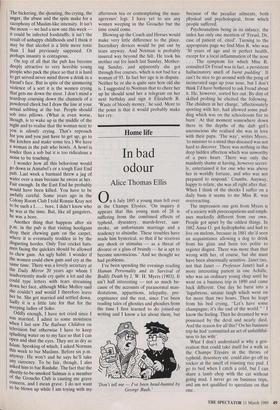Home life
In bad odour
Alice Thomas Ellis
0 ii 6 July 1895 a young man fell over in the Champs Elysees. 'On inquiry it appears that this young man of 28 is suffering from the combined effects of typhoid, dysentery, marsh-fever, sun- stroke, an unfortunate marriage and a tendency to absinthe. These troubles have made him hysterical, so that if he receives any shock or stimulus — as a threat of divorce or a glass of brandy — he is apt to become unconscious.' And we thought we had problems.
I've been spending the evenings reading Human Personality and its Survival of Bodily Death by J. W. H. Myers (1903). It isn't half interesting — not so much be- cause of the accounts of paranormal man- ifestations, apparitions, telepathy, pre- cognisance and the rest, since I've been reading tales of ghosties and ghoulies from the time I first learned to do joined-up writing and I know a lot about them, but 'Don't tell me — I've been head-hunted by George Bush.' because of the peculiar ailments, both physical and psychological, from which people suffered.
Psychoanalysis being in its infancy, the index has only one mention of 'Freud, Dr, case of patient of, cited'. Turning to the appropriate page we find Miss R. who was '30 years of age and in perfect health, except for a local inflammation of the nose . . . The symptom for which Miss R. consulted Dr Freud was in fact, a persistent hallucinatory smell of burnt pudding'. It can't be nice to go around with the pong of incinerated sago up your nose, but I don't think I'd have bothered to ask Freud about it. He, however, sorted her out. By dint of skilled probing he elicited the following. The children in her charge, 'affectionately sporting with her, had allowed some pud- ding which was on the schoolroom fire to burn'. At that moment somewhere down there in the depths of the daft girl's unconscious she realised she was in love with their papa. 'The way', writes Myers, `to minister to a mind thus diseased was not hard to discover. There was nothing in this deep hidden affection which was unworthy of a pure heart. There was only the maidenly shame at having, however secret- ly, entertained it for one who was above her in worldly fortune, and who was not prepared to respond.' Crumbs. Anyway, happy to relate, she was all right after that. When I think of the shocks I suffer on a daily basis it seems to me Miss R. was overreacting.
The impression one gets from Myers is of a society with preoccupations and emph- ases markedly different from our own. People got upset by the oddest things. In 1882 Anna 0. got hydrophobic and had to live on melons, because in 1881 she'd seen an acquaintance allowing a dog to drink from his glass and been too polite to register disgust. There was more than that wrong with her, of course, but she must have been abnormally sensitive. Janet (no, not that Janet — Professor Janet) had a more interesting patient in one Achille, who was an ordinary young chap until he went on a business trip in 1890 and came back different. One day he burst into a 'lugubrious, satanic laugh which went on for more than two hours. Then he leapt from his bed crying, "Let's have some champagne; it's the end of the world." ' I know the feeling. Then he dreamed he was possessed by the devil and nearly died. And the reason for all this? On his business trip he had 'committed an act of unfaithful- ness to his wife'.
What I don't understand is why a gen- eration that could take itself for a walk in the Champs Elysees in the throes of typhoid, dysentery etc. could also go off its rocker at the smell of roasting rice pud. I go to bed when I catch a cold, but I can share a lamb chop with the cat without going mad. I never go on business trips, and am not qualified to speculate on that one.


























































 Previous page
Previous page